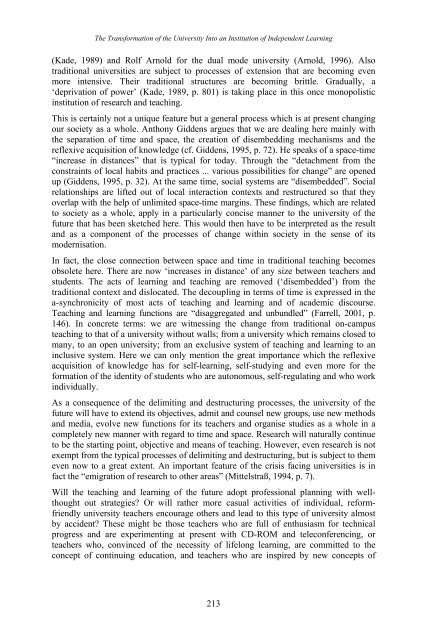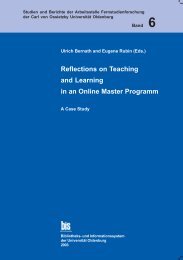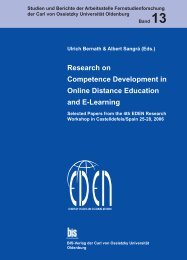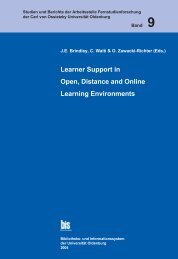Distance Education in Transition - Master of Distance Education ...
Distance Education in Transition - Master of Distance Education ...
Distance Education in Transition - Master of Distance Education ...
Create successful ePaper yourself
Turn your PDF publications into a flip-book with our unique Google optimized e-Paper software.
The Transformation <strong>of</strong> the University Into an Institution <strong>of</strong> Independent Learn<strong>in</strong>g<br />
(Kade, 1989) and Rolf Arnold for the dual mode university (Arnold, 1996). Also<br />
traditional universities are subject to processes <strong>of</strong> extension that are becom<strong>in</strong>g even<br />
more <strong>in</strong>tensive. Their traditional structures are becom<strong>in</strong>g brittle. Gradually, a<br />
‘deprivation <strong>of</strong> power’ (Kade, 1989, p. 801) is tak<strong>in</strong>g place <strong>in</strong> this once monopolistic<br />
<strong>in</strong>stitution <strong>of</strong> research and teach<strong>in</strong>g.<br />
This is certa<strong>in</strong>ly not a unique feature but a general process which is at present chang<strong>in</strong>g<br />
our society as a whole. Anthony Giddens argues that we are deal<strong>in</strong>g here ma<strong>in</strong>ly with<br />
the separation <strong>of</strong> time and space, the creation <strong>of</strong> disembedd<strong>in</strong>g mechanisms and the<br />
reflexive acquisition <strong>of</strong> knowledge (cf. Giddens, 1995, p. 72). He speaks <strong>of</strong> a space-time<br />
“<strong>in</strong>crease <strong>in</strong> distances” that is typical for today. Through the “detachment from the<br />
constra<strong>in</strong>ts <strong>of</strong> local habits and practices ... various possibilities for change” are opened<br />
up (Giddens, 1995, p. 32). At the same time, social systems are “disembedded”. Social<br />
relationships are lifted out <strong>of</strong> local <strong>in</strong>teraction contexts and restructured so that they<br />
overlap with the help <strong>of</strong> unlimited space-time marg<strong>in</strong>s. These f<strong>in</strong>d<strong>in</strong>gs, which are related<br />
to society as a whole, apply <strong>in</strong> a particularly concise manner to the university <strong>of</strong> the<br />
future that has been sketched here. This would then have to be <strong>in</strong>terpreted as the result<br />
and as a component <strong>of</strong> the processes <strong>of</strong> change with<strong>in</strong> society <strong>in</strong> the sense <strong>of</strong> its<br />
modernisation.<br />
In fact, the close connection between space and time <strong>in</strong> traditional teach<strong>in</strong>g becomes<br />
obsolete here. There are now ‘<strong>in</strong>creases <strong>in</strong> distance’ <strong>of</strong> any size between teachers and<br />
students. The acts <strong>of</strong> learn<strong>in</strong>g and teach<strong>in</strong>g are removed (‘disembedded’) from the<br />
traditional context and dislocated. The decoupl<strong>in</strong>g <strong>in</strong> terms <strong>of</strong> time is expressed <strong>in</strong> the<br />
a-synchronicity <strong>of</strong> most acts <strong>of</strong> teach<strong>in</strong>g and learn<strong>in</strong>g and <strong>of</strong> academic discourse.<br />
Teach<strong>in</strong>g and learn<strong>in</strong>g functions are “disaggregated and unbundled” (Farrell, 2001, p.<br />
146). In concrete terms: we are witness<strong>in</strong>g the change from traditional on-campus<br />
teach<strong>in</strong>g to that <strong>of</strong> a university without walls; from a university which rema<strong>in</strong>s closed to<br />
many, to an open university; from an exclusive system <strong>of</strong> teach<strong>in</strong>g and learn<strong>in</strong>g to an<br />
<strong>in</strong>clusive system. Here we can only mention the great importance which the reflexive<br />
acquisition <strong>of</strong> knowledge has for self-learn<strong>in</strong>g, self-study<strong>in</strong>g and even more for the<br />
formation <strong>of</strong> the identity <strong>of</strong> students who are autonomous, self-regulat<strong>in</strong>g and who work<br />
<strong>in</strong>dividually.<br />
As a consequence <strong>of</strong> the delimit<strong>in</strong>g and destructur<strong>in</strong>g processes, the university <strong>of</strong> the<br />
future will have to extend its objectives, admit and counsel new groups, use new methods<br />
and media, evolve new functions for its teachers and organise studies as a whole <strong>in</strong> a<br />
completely new manner with regard to time and space. Research will naturally cont<strong>in</strong>ue<br />
to be the start<strong>in</strong>g po<strong>in</strong>t, objective and means <strong>of</strong> teach<strong>in</strong>g. However, even research is not<br />
exempt from the typical processes <strong>of</strong> delimit<strong>in</strong>g and destructur<strong>in</strong>g, but is subject to them<br />
even now to a great extent. An important feature <strong>of</strong> the crisis fac<strong>in</strong>g universities is <strong>in</strong><br />
fact the “emigration <strong>of</strong> research to other areas” (Mittelstraß, 1994, p. 7).<br />
Will the teach<strong>in</strong>g and learn<strong>in</strong>g <strong>of</strong> the future adopt pr<strong>of</strong>essional plann<strong>in</strong>g with wellthought<br />
out strategies? Or will rather more casual activities <strong>of</strong> <strong>in</strong>dividual, reformfriendly<br />
university teachers encourage others and lead to this type <strong>of</strong> university almost<br />
by accident? These might be those teachers who are full <strong>of</strong> enthusiasm for technical<br />
progress and are experiment<strong>in</strong>g at present with CD-ROM and teleconferenc<strong>in</strong>g, or<br />
teachers who, conv<strong>in</strong>ced <strong>of</strong> the necessity <strong>of</strong> lifelong learn<strong>in</strong>g, are committed to the<br />
concept <strong>of</strong> cont<strong>in</strong>u<strong>in</strong>g education, and teachers who are <strong>in</strong>spired by new concepts <strong>of</strong><br />
213





